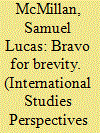| Srl | Item |
| 1 |
ID:
130926


|
|
|
|
|
| Publication |
2014.
|
| Summary/Abstract |
This paper examines the use of short writing assignments in undergraduate international relations courses. It gives instructors ideas about thinking beyond traditional research papers and instead focuses on shorter assignments that demand critical thinking skills. The ability to write concisely is useful for students with future careers in government, business, nonprofits, journalism, electoral politics, or academia. By requiring application of theoretical frameworks (perhaps as policy recommendations in a memo), students can see how policymakers employ international relations theories, thereby simulating the work inside the National Security Council or US State Department. This highlights the connections between theory and policy. Short papers can also better showcase role playing and connect with active learning techniques. Research papers of 10 pages or more may not be as useful as shorter assignments that focus students' attention on analyzing an issue, presenting a case study, or writing a policy brief.
|
|
|
|
|
|
|
|
|
|
|
|
|
|
|
|
| 2 |
ID:
082628


|
|
|
|
|
| Publication |
2008.
|
| Summary/Abstract |
.S. governors lead overseas missions seeking investment and promoting trade, establish international offices, meet with heads of government, receive ambassadors, and take positions on foreign policy. This paper describes how governors are involved in participating in U.S. foreign policy, explains why governors seek to voice their views and play an active role in working with leaders and issues beyond their state's borders, and argues that U.S. states and governors need to be better conceptualized and considered in both international relations theory and foreign policy analysis. This study reveals that governors with greater institutional powers-such as appointment and budgetary control-as well as personal powers-derived from their electoral mandate, ambition, and public approval-are more likely to have higher degrees of foreign policy activity. These actions are more likely to take place during wartime and also from governors representing U.S. states bordering Canada or Mexico
|
|
|
|
|
|
|
|
|
|
|
|
|
|
|
|